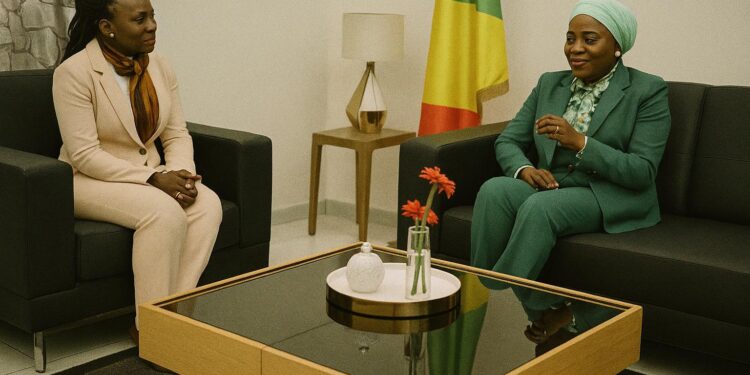From Crude Barrels to Container Decks
The cordial exchange on 16 July in Brazzaville between Minister Ingrid Olga Ghislaine Ebouka-Babackas and Ambassador Laura Evangelia Suárez signalled a calculated shift in Congolese-Venezuelan relations. For two decades the conversation had been dominated by upstream oil assets, joint drilling licences and the choreography of OPEC+ quotas. Yet both officials now speak in the language of dead-weight tonnage and port logistics, illustrating how bilateral energy ties are evolving into a broader commercial maritime endeavour. Officials in Brazzaville note that diversification of cooperation is a constitutional priority of the Plan national de développement 2022-2026, which emphasises maritime services as a driver of non-oil growth. Caracas, for its part, seeks reliable third-country port calls to hedge against certain Atlantic freight constraints created by sanctions pressure on its fleet (PetroGuía, 2023).
Strategic Rationale for Maritime Cooperation
Congolese authorities have long considered the Gulf of Guinea a potential logistics gateway for Central Africa, yet container throughput at Pointe-Noire remains below its design capacity. Venezuelan experience operating Aframax and Suezmax tankers could offer valuable technical spill-overs: crew training, ship-to-ship transfer protocols and the drafting of modern flag-state regulations. For Venezuela, whose state-owned PDV Marina maintains a fleet accustomed to long transatlantic hauls, a partnership offers the prospect of intermediate maintenance hubs, bunkering services and dry-dock options outside its traditional Caribbean sphere. Analysts at the Economic Commission for Africa underscore that South-South maritime corridors can reduce freight costs by up to 14 %, a statistic that resonates in both ministries as they attempt to shield their economies from exogenous volatility (ECA, 2022).
Legal and Institutional Architecture in Brazzaville
The Congolese legislature recently updated the Merchant Shipping Code, harmonising safety and environmental clauses with the International Maritime Organization’s 2020 sulfur cap. This regulatory refresh positions Brazzaville to negotiate fleet-sharing or joint-venture agreements on more competitive terms, while simultaneously reinforcing its commitment to sustainable development goals. Senior officials inside the Directorate of Maritime Affairs point to the successful certification of Port Autonome de Pointe-Noire under ISPS standards as an encouraging precedent. Within this framework, a memorandum of understanding with Venezuela could encompass cabotage exemptions, preferential berthing windows and shared training curricula at the Higher Institute of the Sea in Congo — a facility that recently expanded its simulator suite with financing from the African Development Bank.
Economic Multipliers for a Diversified Congolese Economy
Transport economists in Brazzaville calculate that every additional million tonnes of maritime cargo processed domestically creates roughly 1 600 direct and indirect jobs, an argument that dovetails neatly with government objectives to broaden its revenue base beyond hydrocarbons. A fleet co-flagged or co-managed with Venezuelan counterparts could capture some of the lucrative coastal tramp trade currently handled by foreign registries. Meanwhile, expanded ship repair activities would create demand for Congolese steel fabrication, welding and electrical engineering services, sectors highlighted in the national industrialisation blueprint. Representatives of the National Union of Congolese Dockworkers welcomed the preliminary announcement, stating that ‘any initiative that increases vessel calls will reinforce labour stability’.
Venezuelan Logistical Capabilities and Incentives
Despite macro-economic headwinds, Venezuela retains a cadre of seasoned maritime professionals and a partially modernised tanker fleet. The Bolivarian University of Venezuela graduates over 200 deck and engine officers annually, a resource pool Caracas is eager to deploy abroad through exchange programmes. Diplomatic sources indicate that PDV Marina has earmarked two medium-range product carriers for potential deployment on Gulf of Guinea routes. By partnering with Congo, Venezuelan planners could diversify port-of-call options, reduce ballast mileage and build political goodwill in an African sub-region that has historically been receptive to Bolivarian diplomacy, as evidenced by recent cooperative engagements with Equatorial Guinea and Ghana.
Regional and Multilateral Dimensions
The envisaged maritime partnership aligns neatly with the African Continental Free Trade Area, whose tariff reductions will likely boost intra-African shipping demand. Congo-Brazzaville’s intent to become a sub-regional logistics node meshes with the Central African Economic and Monetary Community’s transport master plan, offering a platform for Venezuelan stakeholders to engage not only bilaterally but also with multilateral financing instruments. Furthermore, both nations enjoy observer status in the Non-Aligned Movement’s working group on maritime connectivity; coordinated positions there could amplify their collective leverage in discussions on equitable ocean governance.
Navigating Forward: Opportunities and Prudence
Officials caution that complex technical, financial and insurance questions remain. Vessel classification, access to credit in a post-Basel III environment and the global surplus of shipping capacity impose constraints that will demand meticulous feasibility studies. Nevertheless, the political will expressed in Brazzaville, anchored by President Denis Sassou Nguesso’s commitment to diversified, outward-looking diplomacy, provides a stable backdrop. By weaving Venezuelan maritime know-how into Congo’s emerging blue economy strategy, the two republics may chart a pragmatic path that strengthens their sovereignty over supply chains while contributing to the wider agenda of South-South cooperation.












































